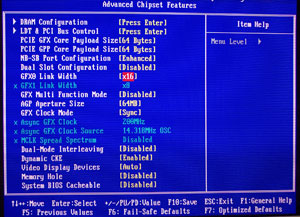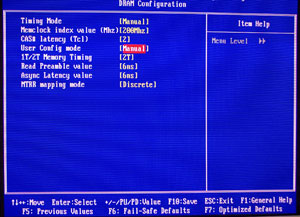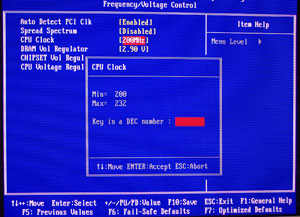BIOS
During the time spent with the board, EQS produced and sent over several BIOS revisions that both improved performance, tidied up the BIOS option layout and fixed a stability issue with the memory subsystem that had this reviewer stumped for a short time. It's worth mentioning before we look at the BIOS (at an admittedly one-less-than-latest revision) that EQS have impressed with the timely and competent levels of service they're able to bring in terms of BIOS updates and support. I'll come back to that in due course.The BIOS is your standard AWARD fare with EQS-specific additions and changes that fit this particular SKU. Of note but not worth showing in pictures is the PC Health section with comprehensive monitoring support and ability to shutdown at a certain monitored temperature.
Most of the manipulating you can give the A72K9-CF can be found in the Advanced Chipset section.
You can see the entries for entering the DRAM configuration section and the HyperTransport control section, more on which shortly. There are options for adjusting the speed of the connection between north and southbridge (basically PCI Express) and turning support for Crossfire on and off (ignore the options for controlling onboard VGA).
The DRAM timing options are much improved in the very latest BIOS revision (not pictured here) where you get adjust of the main timing group (Trcd-Trp-Tras) as well as CAS latency and 1T/2T timing (automatically 2T with four sticks of memory on the A72K9-CF). Maximum memory clock is 250MHz (when using a revision E Athlon 64 processor, 200MHz otherwise) and you get up to 2.90V Vdimm for driving your memory modules.
As you can see, CPU clock stops at 232MHz limiting the overclock available on the CPU side of things somewhat. It's unclear if EQS can raise the upper limit in any future BIOS revisions given the clock generator on the mainboard but if it's possible in hardware it's likely that EQS can attempt it in software in the BIOS.












